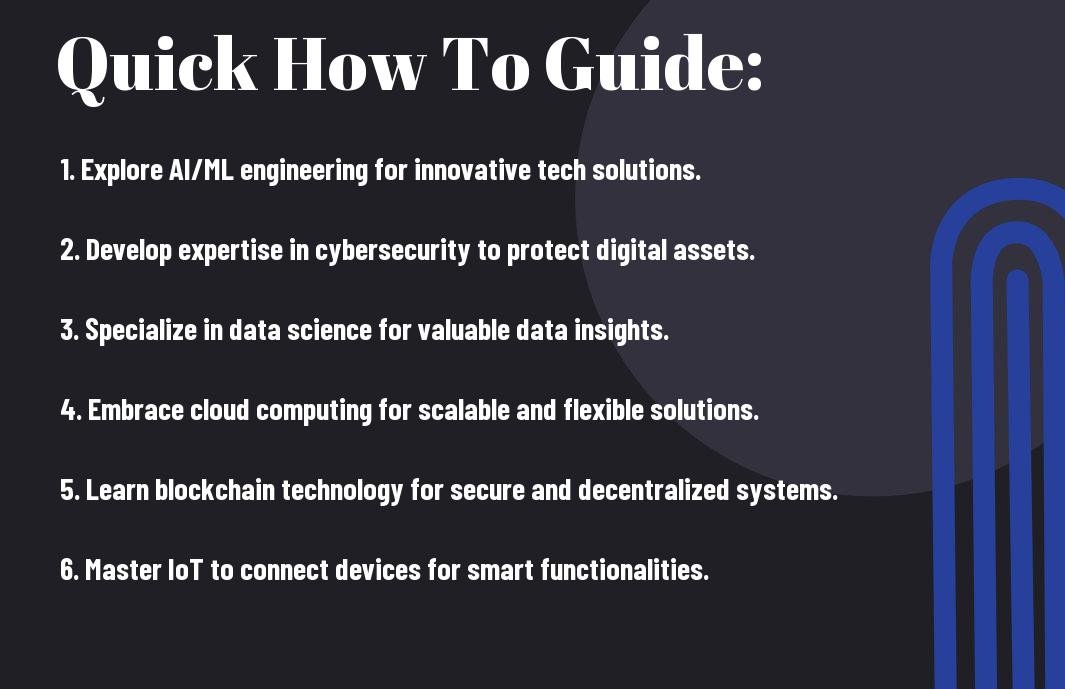As technology continues to evolve at a rapid pace, you must stay ahead of the curve to secure a successful career in the tech industry. The year 2024 and beyond are set to offer groundbreaking opportunities in the tech field, with several high-demand roles poised to take center stage. Whether you are a seasoned professional or a tech enthusiast looking to break into the industry, this guide will highlight the top tech careers that are projected to soar in the coming years.
From artificial intelligence and cybersecurity to cloud computing and data science, the tech industry is brimming with dynamic career paths that offer lucrative opportunities for growth and innovation. By keeping an eye on the latest trends and skill requirements, you can position yourself for a rewarding career in a field that is reshaping the way we live and work. This guide will provide valuable insights into the top tech careers that will be in high demand in 2024 and beyond, empowering you to make informed decisions about your future in tech.
Whether you are interested in becoming a machine learning engineer, a blockchain developer, or a chief data officer, the tech industry offers a wealth of opportunities for innovative professionals. By understanding the key skills and qualifications required for these emerging roles, you can position yourself as a valuable asset in the tech job market. Stay tuned to explore the top tech careers that are set to revolutionize the industry in 2024 and beyond, and take the first step towards a rewarding career in the dynamic world of technology.
Key Takeaways:
- Artificial Intelligence (AI) Specialists: Demand for AI specialists is expected to rise as companies continue to implement AI technologies in various industries.
- Data Scientists: The need for data scientists will continue to increase as businesses rely on data-driven insights to make informed decisions.
- Cybersecurity Experts: With the rise in cyber threats, the demand for cybersecurity experts will remain high to protect sensitive data and systems.
- Cloud Architects: As more businesses transition to cloud-based systems, the role of cloud architects will be crucial in designing and implementing cloud infrastructure.
- Blockchain Developers: The blockchain technology is gaining popularity, creating opportunities for developers to work on secure and transparent digital transactions.
- Virtual Reality (VR) and Augmented Reality (AR) Developers: With the increasing use of VR and AR in various fields, developers in this space will be in high demand.
- Machine Learning Engineers: As machine learning continues to drive innovation in automation and decision-making processes, the demand for machine learning engineers will rise.


How to Identify Emerging Tech Careers
Understanding the Tech Industry Landscape
The tech industry is a fast-paced and constantly evolving field that offers a diverse range of career opportunities. To successfully identify emerging tech careers, it is crucial to have a deep understanding of the industry landscape. Tech breakthroughs in artificial intelligence, blockchain, cybersecurity, and virtual reality are shaping the future job market. By staying informed about the latest trends and developments in these areas, aspiring tech professionals can position themselves for success in the rapidly changing industry.
Furthermore, keeping an eye on the major players in the tech industry, such as Google, Facebook, Amazon, and Apple, can provide valuable insights into the direction in which technology is heading. These companies often lead the way in innovation and can serve as a barometer for emerging tech careers. By studying their strategies and investments, individuals can gain a competitive edge in identifying promising opportunities for growth and advancement.
Additionally, networking with professionals in the tech industry, attending conferences and industry events, and participating in online forums and communities can help individuals stay abreast of the latest developments and emerging tech trends. Building a strong professional network and continuous learning are crucial components for navigating the dynamic tech industry landscape and identifying new career pathways.
Tips for Keeping Ahead of Tech Advancements
Any aspiring tech professional looking to stay ahead of the curve and identify emerging tech careers should prioritize continuous learning and skills development. Updating skills in areas such as artificial intelligence, data science, cloud computing, and cybersecurity can significantly enhance one’s employability and open up new career opportunities.
- Attend industry conferences and workshops to stay current with the latest trends
- Engage in online courses and certifications to enhance your skills and knowledge
- Network with industry professionals to gain insights and stay informed about potential career paths
Plus, embracing a growth mindset and being open to experimentation and continuous learning are crucial qualities for thriving in the ever-evolving tech industry. By actively seeking out opportunities to expand their skills and knowledge, tech professionals can position themselves as valuable assets in the job market and stay competitive in the face of rapid technological advancements.
Artificial Intelligence and Machine Learning
Unlike many other tech fields, Artificial Intelligence (AI) and Machine Learning (ML) have been on a rapid growth trajectory in recent years, and this trend is expected to continue well into 2024 and beyond. AI and ML are the driving forces behind many cutting-edge technologies such as self-driving cars, smart assistants, and personalized recommendations. As the demand for AI and ML experts continues to rise, so do the opportunities for those looking to start a career in this exciting field.
How to Start a Career in AI and ML
On the path to a career in AI and ML, a strong foundation in computer science, mathematics, and statistics is imperative. Familiarity with programming languages such as Python, R, and Java is also highly advantageous. Online courses, bootcamps, and formal education programs specializing in AI and ML are readily available for those looking to enhance their skills and knowledge in this field. Additionally, gaining practical experience through internships or personal projects can help build a strong portfolio and demonstrate proficiency to potential employers.
Factors Contributing to the Growth of AI and ML Jobs
Artificial intelligence and machine learning have tremendous potential to revolutionize industries across the board, from healthcare to finance to transportation. The increasing availability of big data, advancements in computing power, and the ongoing development of sophisticated algorithms are key factors driving the demand for AI and ML professionals. As organizations seek to leverage data-driven insights for competitive advantage, the need for experts in AI and ML will only continue to grow.
- Big data: The exponential growth of data generated by businesses and individuals is fueling the need for AI and ML experts to derive valuable insights from this vast amount of information.
- Advancements in computing power: The availability of high-performance computing resources and cloud technologies has enabled the development and deployment of complex AI and ML models at scale.
- Sophisticated algorithms: Ongoing research and innovation in AI and ML algorithms are constantly pushing the boundaries of what is possible, opening up new opportunities for applications in various industries.
With the exponential growth of data, advancements in computing power, and the continuous evolution of algorithms, the demand for skilled AI and ML professionals is expected to skyrocket in the coming years. Organizations that harness the power of AI and ML have the potential to gain a competitive edge in their respective industries, making these roles among the most sought-after in the tech sector. Perceiving the significance of AI and ML in shaping the future of technology, individuals looking to commence on a career in this field are well-positioned for exciting and rewarding opportunities.
Cybersecurity
Despite the increasing digitalization of our world, the rise of cyber threats has made cybersecurity one of the most critical fields today. As technology advances, so do the tactics of cyber criminals, emphasizing the importance of skilled professionals to safeguard sensitive information and systems.
How to Forge a Path in Cybersecurity
On the path to a successful career in cybersecurity, it is imperative to start with a strong educational foundation. Pursuing a degree in computer science, information technology, or cybersecurity can provide the necessary knowledge and skills to excel in this field. Additionally, gaining hands-on experience through internships or entry-level positions can help you apply theoretical concepts to real-world scenarios.
Networking with professionals already working in cybersecurity can also open doors to opportunities and valuable insights. Attending industry conferences, joining online forums, and participating in cybersecurity competitions can help you build a strong professional network and stay updated on the latest trends and technologies in the field.
Obtaining relevant certifications, such as Certified Information Systems Security Professional (CISSP) or Certified Ethical Hacker (CEH), can further enhance your credibility and marketability in the cybersecurity industry. Continuous learning and staying informed about new threats and defense strategies are key to advancing your career in this ever-evolving field.
Tips for Staying Current in the Evolving Cybersecurity Field
Tips for staying current in the evolving cybersecurity field include:
- Continuous Learning: Stay updated on the latest security trends, tools, and techniques through online courses, workshops, and seminars.
- Networking: Build relationships with fellow cybersecurity professionals to exchange knowledge and stay informed about industry developments.
- Hands-On Practice: Regularly practice your skills through cybersecurity challenges, simulated environments, and personal projects to stay sharp and improve your abilities.
Understanding the dynamic nature of cybersecurity is crucial for professionals in this field. The constant evolution of cyber threats requires individuals to adapt quickly and continuously upgrade their skills and knowledge. Staying current in cybersecurity is not only vital for career advancement but also imperative for protecting organizations from increasingly sophisticated cyber attacks. The future of cybersecurity relies on professionals who are proactive, knowledgeable, and adaptable to the ever-changing digital landscape.
Data Science and Analytics
Now, let’s probe into the world of Data Science and Analytics, a field that is continuously evolving and shaping the future of technology. In this era of digital transformation, the ability to extract insights from data is more crucial than ever. Data professionals are in high demand as businesses strive to make data-driven decisions to stay competitive in the market.
How to Build a Data-Driven Career
Analytics is at the core of a data-driven career. To build a successful path in data science and analytics, one must possess a strong foundation in statistics, programming languages like Python and R, as well as machine learning techniques. Continuous upskilling and learning new tools and technologies will be important to stay ahead in this rapidly changing field. Practical experience through internships, projects, and certifications can also boost your credibility as a data professional.
Factors Driving the Demand for Data Professionals
Build a career in data science and analytics by understanding the factors fueling the demand for data professionals. The exponential growth of data, advancements in artificial intelligence and machine learning, and the need for data-driven decision-making are key drivers for the rising demand for data scientists and analysts. Organizations across industries are leveraging data to gain actionable insights, optimize operations, and drive innovation. Perceiving the value of data in today’s digital landscape is crucial for professionals aiming to excel in this field.
- Exponential growth of data: The vast amount of data generated daily requires skilled professionals to analyze and derive meaningful insights.
- Advancements in AI and ML: The integration of AI and ML technologies in business processes necessitates expertise in data science and analytics.
- Data-driven decision-making: Companies are increasingly relying on data to make strategic decisions, creating a high demand for professionals with analytical skills.
Factors Driving the Demand for Data Professionals
Factors fueling the demand for data professionals include the rising need for organizations to harness the power of data to gain a competitive edge. With data becoming the new currency in the digital economy, professionals with expertise in data science and analytics are highly sought after. Companies are investing heavily in data infrastructure and analytics tools to extract insights that drive business growth. Perceiving the intrinsic value of data and its impact on every aspect of business operations is paramount for individuals considering a career in this dynamic field.
Cloud Computing
Despite the rapid evolution of technology, cloud computing continues to be one of the most promising fields in the tech industry. With businesses increasingly turning to cloud services for their infrastructure and applications, the demand for skilled professionals in this area is only expected to rise in the coming years.
How to Become a Cloud Computing Expert
To become a cloud computing expert, one must first have a solid understanding of networking, virtualization, and storage technologies. A degree in computer science or a related field is often necessary, but hands-on experience and certifications such as Amazon Web Services (AWS), Microsoft Azure, or Google Cloud Platform can also significantly boost your credentials in this competitive field.
Next, it is crucial to stay updated with the latest trends and developments in cloud computing. Joining communities and forums dedicated to cloud technologies, attending conferences, and participating in training programs can help you deepen your knowledge and expand your professional network.
Always strive to enhance your problem-solving skills and stay adaptable to new technologies. As a cloud computing expert, your ability to troubleshoot issues, optimize resources, and innovate new solutions will set you apart in this dynamic and fast-paced industry.
Tips for Gaining Practical Experience in Cloud Services
Little practical experience can go a long way in gaining expertise in cloud services. To gain hands-on experience, consider setting up your own cloud environment using platforms like AWS, Azure, or Google Cloud. Practice deploying applications, managing databases, and configuring networking services to strengthen your skills.
- Experiment with different cloud service models such as IaaS, PaaS, and SaaS
- Collaborate on cloud projects with peers or in hackathons to gain teamwork skills
- Stay updated with industry news and best practices in cloud computing
After gaining practical experience, consider pursuing advanced certifications or specializations to further distinguish yourself in the competitive cloud computing job market. Continuous learning and hands-on practice will be key to staying relevant and valuable in this rapidly evolving field.
Tips for Gaining Practical Experience in Cloud Services
Tips for gaining practical experience in cloud services involve creating a solid foundation in cloud computing concepts and technologies through education and certification programs. It is crucial to have hands-on experience with cloud platforms to understand how they work and how they can benefit businesses.
- Seek internships or entry-level positions related to cloud computing
- Engage in personal projects that involve building and deploying applications on the cloud
- Network with professionals in the industry to learn about their experiences and gain insights
After gaining practical experience in cloud services, you can showcase your skills and knowledge through a strong portfolio of projects and certifications.
The Internet of Things (IoT)
How to Start a Career in IoT
On your journey to starting a career in the Internet of Things (IoT), it is vital to acquire a strong foundation in computer science, engineering, or a related field. Having a deep understanding of programming languages such as C, C++, Java, Python, and experience with data analytics will be advantageous. Familiarize yourself with IoT platforms and technologies, as well as cloud computing concepts. Additionally, gaining hands-on experience through internships or personal projects will set you apart in this competitive field.
Understanding the Intersections of IoT and Other Tech Fields
Tech professionals entering the world of IoT must comprehend how this technology intersects with other tech fields such as artificial intelligence (AI), machine learning, and cybersecurity. AI plays a crucial role in enhancing IoT devices’ capabilities through predictive analytics and automation. Similarly, machine learning algorithms help IoT systems adapt and improve their performance over time. Cybersecurity is a significant concern as the proliferation of interconnected devices increases vulnerabilities, making protecting data and ensuring privacy a top priority in IoT development.
Intersections with fields like blockchain can provide secure and transparent transactions for IoT devices, while augmented reality (AR) and virtual reality (VR) technologies can create immersive experiences through IoT-connected devices. Understanding these intersections will not only broaden your knowledge but also open up diverse opportunities in the ever-evolving landscape of IoT applications.
Blockchain Technology
Not just a buzzword anymore, blockchain technology has revolutionized the way we think about data security and transparency. The decentralized nature of blockchain has captured the interest of industries beyond just finance, including healthcare, supply chain management, and even voting systems. As we look towards 2024 and beyond, the demand for blockchain experts is only expected to grow.
How to Break Into the Blockchain Industry
Technology is constantly evolving, and the blockchain industry is no exception. To break into this exciting field, it’s imperative to have a strong foundation in computer science and cryptography. Familiarize yourself with popular blockchain platforms such as Ethereum and Hyperledger, and consider pursuing certifications to enhance your credentials. Networking within the blockchain community through conferences, meetups, and online forums can also provide valuable insights and opportunities.
Tips for Navigating the Blockchain Career Landscape
The blockchain career landscape can be both rewarding and challenging to navigate. It’s crucial to stay updated on the latest trends and developments in the industry, as regulations and technologies are constantly evolving. Building a strong professional network and seeking mentorship from seasoned experts can help you stay ahead of the curve. Assume that job opportunities in blockchain will continue to expand across various sectors, offering diverse paths for career growth and specialization.
Virtual and Augmented Reality
Many tech enthusiasts and aspiring developers are keeping a close eye on the rapid advancements in Virtual Reality (VR) and Augmented Reality (AR) technologies. These immersive technologies have the potential to revolutionize various industries, including gaming, healthcare, education, and more. As the demand for VR and AR experiences continues to grow, so does the need for skilled professionals who can develop cutting-edge applications and solutions.
How to Craft a Career in VR and AR Development
Some key steps to building a successful career in VR and AR development include gaining a strong foundation in programming languages such as C++, C#, and Python, acquiring a deep understanding of 3D modeling and design principles, and honing your skills in Unity or Unreal Engine development. It’s also imperative to stay updated on the latest trends and technologies in the VR and AR space by attending workshops, conferences, and online courses.
Factors Influencing the Rise of Immersive Technologies
Some of the key factors driving the rapid growth of VR and AR technologies include advancements in hardware capabilities, the increasing demand for immersive gaming experiences, and the integration of AR in various industries for training and simulation purposes. As more companies explore the potential of VR and AR to enhance customer experiences and improve operational efficiencies, the job market for skilled VR and AR developers is expected to continue expanding.
- Hardware capabilities: Advancements in hardware, such as more powerful GPUs and lighter VR headsets, are making immersive experiences more accessible.
- Immersive gaming: The gaming industry is driving innovation in VR and AR, creating new opportunities for developers to showcase their skills.
- Integration in industries: Companies are increasingly leveraging VR and AR for training, product design, and marketing initiatives.
The future of VR and AR technologies is filled with immense potential to reshape how we interact with digital content and the physical world. Developers who can harness the power of these immersive technologies will be at the forefront of innovation in the coming years. However, it’s crucial to stay adaptable and continuously upskill to keep pace with the evolving industry landscape. This dynamic field offers exciting opportunities for those passionate about creating immersive and interactive experiences that push the boundaries of technology.
Edge Computing
How to Understand the Edge Computing Surge
Not just a buzzword anymore, edge computing is revolutionizing the way data is processed, stored, and delivered. While cloud computing has been the norm for years, the surge in edge computing is driven by the need for real-time data processing and reduced latency. With the exponential growth of IoT devices and the demand for faster data analysis, edge computing brings the processing power closer to the data source, improving efficiency and speed.
As more industries adopt edge computing solutions, professionals need to stay ahead of the curve by understanding its complexities and benefits. Edge computing offers a decentralized approach to data management, enabling organizations to analyze critical information at the source. This shift reduces the burden on centralized data centers and enhances data security by keeping sensitive information closer to where it’s generated.
With edge computing poised to become the future of data processing, individuals looking to build a successful tech career should familiarize themselves with this disruptive technology. By gaining expertise in edge computing architectures, data analytics, and cybersecurity measures, professionals can position themselves as valuable assets in the digital landscape.
Tips for Building an Edge Computing Career
Any tech enthusiast aiming to capitalize on the edge computing surge should focus on acquiring specialized skills that cater to this evolving field. Embracing edge computing certifications and courses can provide a strong foundation for understanding the intricacies of this technology, preparing individuals for the demands of the industry. After all, staying relevant in the tech world requires continuous learning and adaptation.
- Develop proficiency in edge computing architectures
- Enhance skills in data analytics and real-time processing
- Stay updated on cybersecurity measures for edge devices
The increasing reliance on edge computing across various sectors presents numerous opportunities for career growth and innovation. By honing the necessary skills and staying informed about industry trends, professionals can carve a successful path in this dynamic field. After all, being at the forefront of technological advancements is key to thriving in the competitive tech landscape.
5G Technology
How to Prepare for Careers in 5G Technology
After years of anticipation, 5G technology is finally becoming a reality, revolutionizing the way we connect and communicate. As this new era of ultra-fast, low-latency wireless networks unfolds, the demand for skilled professionals in 5G technology is set to skyrocket. Little was known about this technology a few years ago, but now it is shaping up to be one of the most transformative advancements in the tech industry.
To prepare for careers in 5G technology, individuals should consider pursuing advanced degrees in telecommunications, computer science, or electrical engineering. Additionally, gaining hands-on experience through internships or research projects focusing on 5G networks can provide a competitive edge in the job market. Certifications in 5G technology from reputable organizations can also demonstrate expertise and dedication to prospective employers.
Furthermore, staying updated with the latest trends and developments in 5G technology through industry conferences, workshops, and online courses is crucial. Building a professional network within the 5G community can help individuals stay informed about job opportunities and advancements in the field. The future of technology is undoubtedly 5G, and those who are well-prepared will have a wealth of career options available to them.
Identifying the Sectors Most Affected by 5G Innovations
Technology is rapidly evolving, and 5G innovations are at the forefront of this transformation. Industries such as healthcare, manufacturing, transportation, and entertainment are expected to be most affected by the implementation of 5G technology. The enhanced connectivity and reduced latency offered by 5G networks can revolutionize operations in these sectors, leading to increased efficiency and innovation.
The healthcare industry stands to benefit significantly from 5G technology, enabling remote surgeries, real-time patient monitoring, and telemedicine services. In manufacturing, smart factories powered by 5G can improve automation processes, while in transportation, autonomous vehicles can communicate seamlessly with traffic management systems, enhancing safety and traffic flow. Additionally, the entertainment industry can deliver immersive experiences through augmented and virtual reality applications supported by 5G networks.
With the rise of 5G technology, professionals in these sectors must adapt to the rapid changes and acquire the necessary skills to leverage the full potential of 5G networks. Organizations that embrace 5G innovations will gain a competitive edge in their respective industries, driving growth and transforming the way they do business.
Quantum Computing
All technological advancements stem from the evolution of computing power and capabilities. Quantum computing stands at the forefront of a new era in technology, promising exponential speeds and unimaginable processing power. With the potential to solve complex problems that are currently beyond the reach of classical computers, the demand for skilled professionals in this field is set to skyrocket in the coming years.
How to Begin a Career in Quantum Computing
Begin your journey towards a career in quantum computing by laying a strong foundation in mathematics, computer science, and physics. Familiarize yourself with quantum mechanics and algorithms to understand the fundamental principles that govern this revolutionary technology. Pursuing advanced degrees in quantum computing or related fields will provide you with the necessary expertise to tackle the challenges of this cutting-edge industry.
Gain hands-on experience through internships, research projects, or collaborative programs with industry leaders. Networking with professionals in the field and participating in quantum computing conferences and workshops can also broaden your knowledge and open up opportunities for career advancement. Keeping up with the latest developments and innovations in quantum computing is crucial to stay competitive in this rapidly evolving field.
Tips for Staying Abreast of Quantum Advances
- Continuous Learning: Stay updated with the latest research papers, publications, and industry news to expand your knowledge base.
- Join Communities: Engage with online forums, social media groups, and networking events to connect with like-minded individuals and experts in quantum computing.
- Hands-on Projects: Work on practical projects to enhance your skills and experience in quantum computing applications.
Staying informed about breakthroughs in quantum computing is crucial for professionals aiming to make significant contributions to the field. This includes understanding the implications of quantum supremacy, the potential risks associated with quantum security, and the immense possibilities for optimization and problem-solving that quantum computing offers. By staying proactive and adaptable in your approach, you can position yourself as a valuable asset in the ever-evolving landscape of quantum technology.
Autonomous Vehicles
How to Enter the Field of Autonomous Vehicle Technology
On the path to becoming a part of the cutting-edge field of autonomous vehicle technology, individuals need a strong educational background in fields such as computer science, electrical engineering, mechanical engineering, or a related area. A solid foundation in programming languages, algorithms, and artificial intelligence is crucial to understanding the complexities of autonomous systems. Pursuing advanced degrees or certifications in autonomous systems or robotics can also provide a competitive edge in this rapidly evolving industry.
Hands-on experience through internships or research projects with companies working on autonomous vehicles can significantly enhance a candidate’s profile. Networking within the industry and staying updated on the latest developments in autonomous technology through conferences, workshops, and online resources are also important steps towards a successful career in this field.
Continuous learning and adaptability are key qualities for professionals in autonomous vehicle technology, as the industry continues to innovate at a rapid pace. Keeping abreast of emerging trends, regulations, and breakthroughs in autonomous systems will be vital for success in this high-demand and dynamic field.
Understanding the Broad Implications of Autonomy
On a broader scale, autonomous vehicles have the potential to revolutionize transportation systems, urban planning, and environmental sustainability. Some of the key implications of autonomy include enhanced safety on the roads, increased efficiency in transportation networks, and reduced carbon emissions. Autonomous vehicles also have the potential to improve accessibility for individuals with disabilities and the elderly, transforming mobility options for vulnerable populations.
Implications: However, the widespread adoption of autonomous vehicles raises concerns about job displacement in traditional transportation sectors, cybersecurity vulnerabilities, ethical dilemmas in decision-making algorithms, and the need for robust regulatory frameworks to ensure public safety and privacy. Addressing these challenges will require collaboration among industry stakeholders, policymakers, and the public to shape a future where autonomous vehicles can coexist harmoniously with traditional modes of transportation.
Biotechnology and Personalized Medicine
How to Navigate a Career in Biotech and Personalized Medicine
For those interested in pursuing a career in the fascinating field of biotechnology and personalized medicine, the opportunities are limitless. There’s a growing demand for professionals who can leverage cutting-edge technology to revolutionize healthcare and improve patient outcomes. To navigate this career path successfully, individuals should focus on acquiring a strong foundation in biology, genetics, data analysis, and bioinformatics.
Specializing in areas such as genomics, proteomics, or bioinformatics can help professionals stand out in this competitive field. Pursuing advanced degrees or certifications in relevant disciplines can also enhance career prospects and open up doors to exciting opportunities in research, development, and clinical applications of biotechnology and personalized medicine.
Networking with industry experts, attending conferences, and staying updated on the latest advancements in the field are important steps for aspiring professionals to stay ahead in this dynamic and rapidly evolving industry.
Tips for Keeping Up With Medical Tech Advancements
Advancements in medical technology are transforming the healthcare landscape at a rapid pace. Professionals working in biotechnology and personalized medicine need to stay abreast of these changes to remain competitive in the industry. Keeping up with the latest trends and developments in genomics, precision medicine, and bioinformatics is crucial for career growth and success.
- Continuous Learning: Stay updated on the latest research and technologies through online courses, seminars, and workshops.
- Collaboration: Engage with peers and experts in the field to exchange ideas and stay informed about emerging technologies.
- Adaptability: Be prepared to embrace new technologies and methodologies to stay relevant in a rapidly evolving industry.
Perceiving these tips and incorporating them into your professional development can help you thrive in the fast-paced world of biotechnology and personalized medicine.
Plus
Advancements in biotechnology and personalized medicine offer exciting opportunities to revolutionize healthcare and improve patient outcomes. However, professionals in this field must stay vigilant about ethical considerations surrounding the use of personal genetic information and data security to ensure responsible and secure practices. Keeping a watchful eye on regulatory changes and societal implications can help professionals navigate the evolving landscape of medical technology with foresight and integrity.

Final Words
So, as we look ahead to the future of technology careers in 2024 and beyond, it’s crucial to stay informed and prepared for the evolving landscape. By keeping an eye on the trends and advancements in the tech industry, professionals can position themselves for success in high-demand areas like artificial intelligence, cybersecurity, and data science. According to The 12 most in-demand tech jobs for 2024, these fields are set to experience significant growth and offer promising opportunities for those with the right skills and expertise.
With the rapid pace of technological innovation, it’s important for aspiring tech professionals to continuously update their knowledge and acquire new skills to stay competitive in the job market. By investing in ongoing education and professional development, individuals can position themselves as valuable assets to employers seeking top talent in emerging tech fields. Whether pursuing a career in cloud computing, robotics, or software development, staying ahead of the curve is key to achieving long-term success in the ever-evolving tech industry.
In brief, the future of tech careers in 2024 and beyond promises exciting opportunities for professionals with a passion for innovation and a drive to succeed. By staying informed, upskilling, and embracing new technologies, individuals can thrive in high-demand fields and make significant contributions to the digital economy. As we commence on this journey into the future of tech, let’s embrace the possibilities that lie ahead and prepare ourselves for the challenges and rewards that come with being part of a dynamic and ever-changing industry.
FAQ
Q: What are some top tech careers to watch out for in 2024 and beyond?
A: Artificial Intelligence/Machine Learning Engineer, Data Scientist, Cybersecurity Specialist, Cloud Architect, DevOps Engineer, and Blockchain Developer are some top tech careers to watch out for in 2024 and beyond.
Q: What skills are necessary for a career in Artificial Intelligence/Machine Learning?
A: Essential skills for a career in Artificial Intelligence/Machine Learning include proficiency in programming languages like Python, knowledge of algorithms and data structures, understanding of statistics and probability, and experience with machine learning frameworks like TensorFlow or PyTorch.
Q: How can someone become a Data Scientist?
A: To become a Data Scientist, one should have a strong foundation in mathematics and statistics, programming skills in languages like R or Python, knowledge of databases and data manipulation, and experience in data visualization and interpretation.
Q: What is the role of a Cybersecurity Specialist?
A: A Cybersecurity Specialist is responsible for protecting an organization’s computer systems and networks from cyber threats, developing security protocols, conducting risk assessments, and responding to security incidents.
Q: What does a Cloud Architect do?
A: A Cloud Architect designs and implements cloud computing strategies for organizations, oversees cloud application design and management, ensures compliance with cloud regulations, and optimizes cloud infrastructure for performance and cost-efficiency.
Q: What skills are required to become a DevOps Engineer?
A: Skills required to become a DevOps Engineer include knowledge of automation tools, expertise in coding and scripting, understanding of cloud platforms, experience with continuous integration/continuous deployment (CI/CD) pipelines, and strong communication and collaboration skills.
Q: How can one enter the field of Blockchain development?
A: To enter the field of Blockchain development, one should have a background in computer science, knowledge of blockchain platforms like Ethereum or Hyperledger, proficiency in programming languages such as Solidity or C++, understanding of cryptography, and experience in developing decentralized applications.











